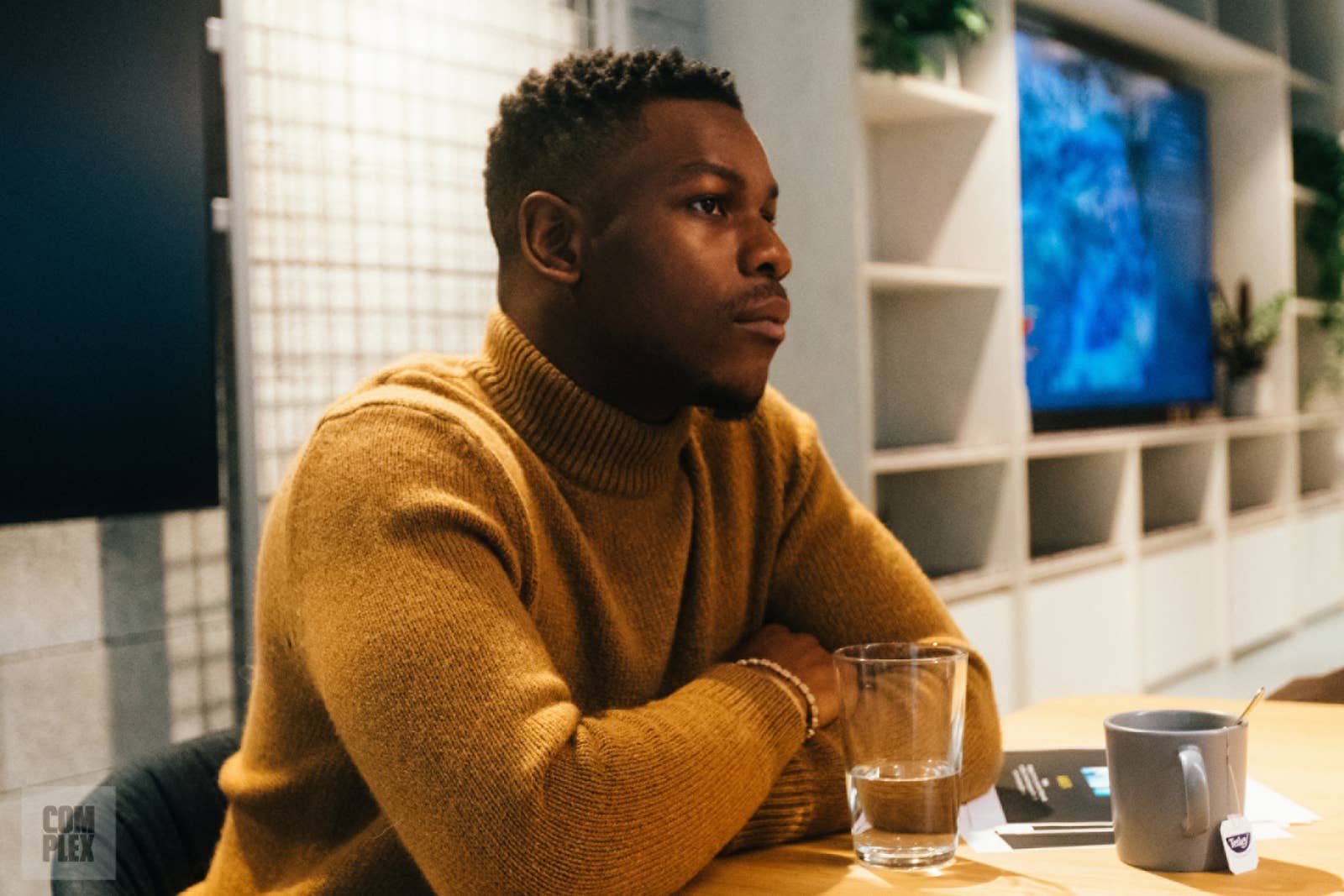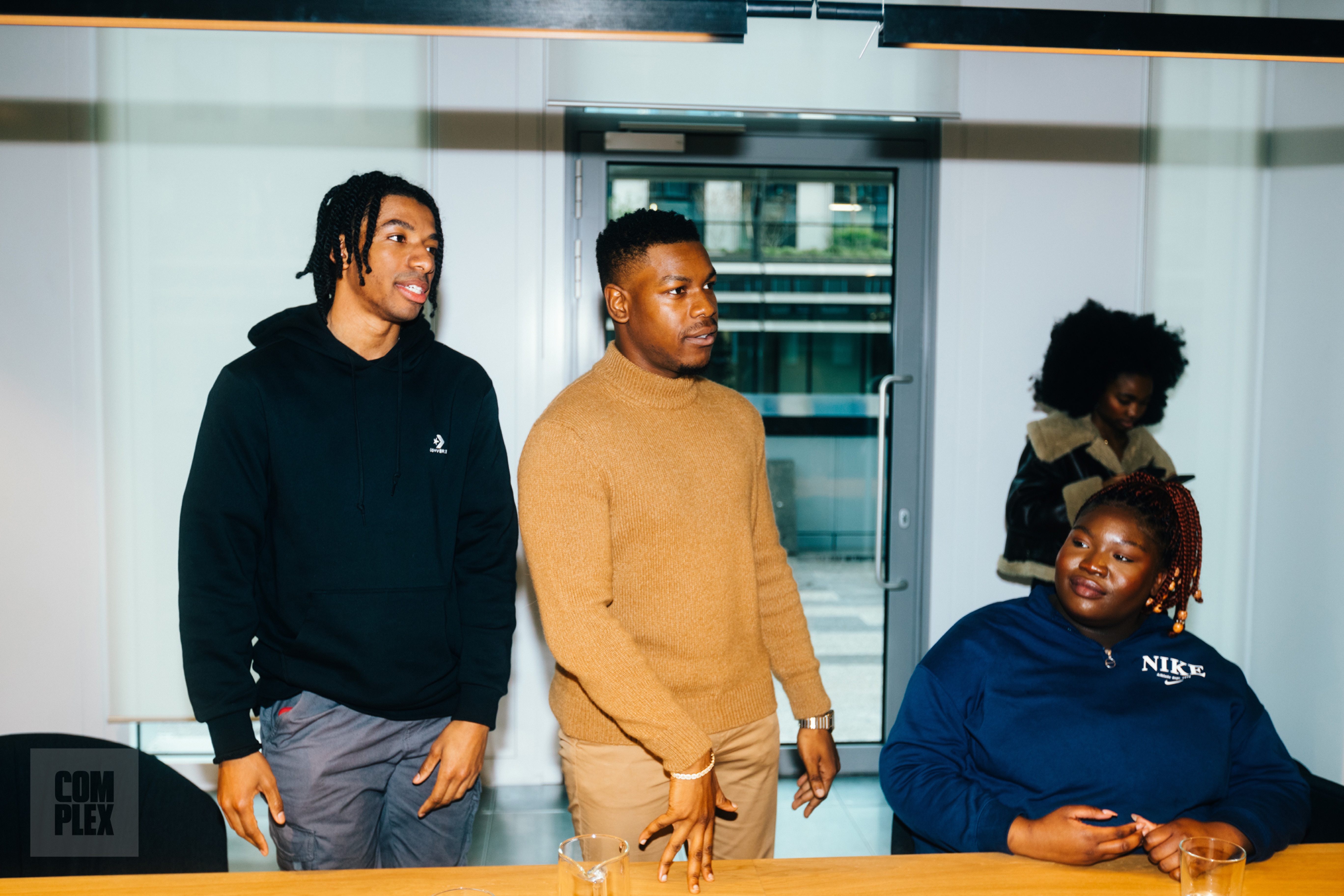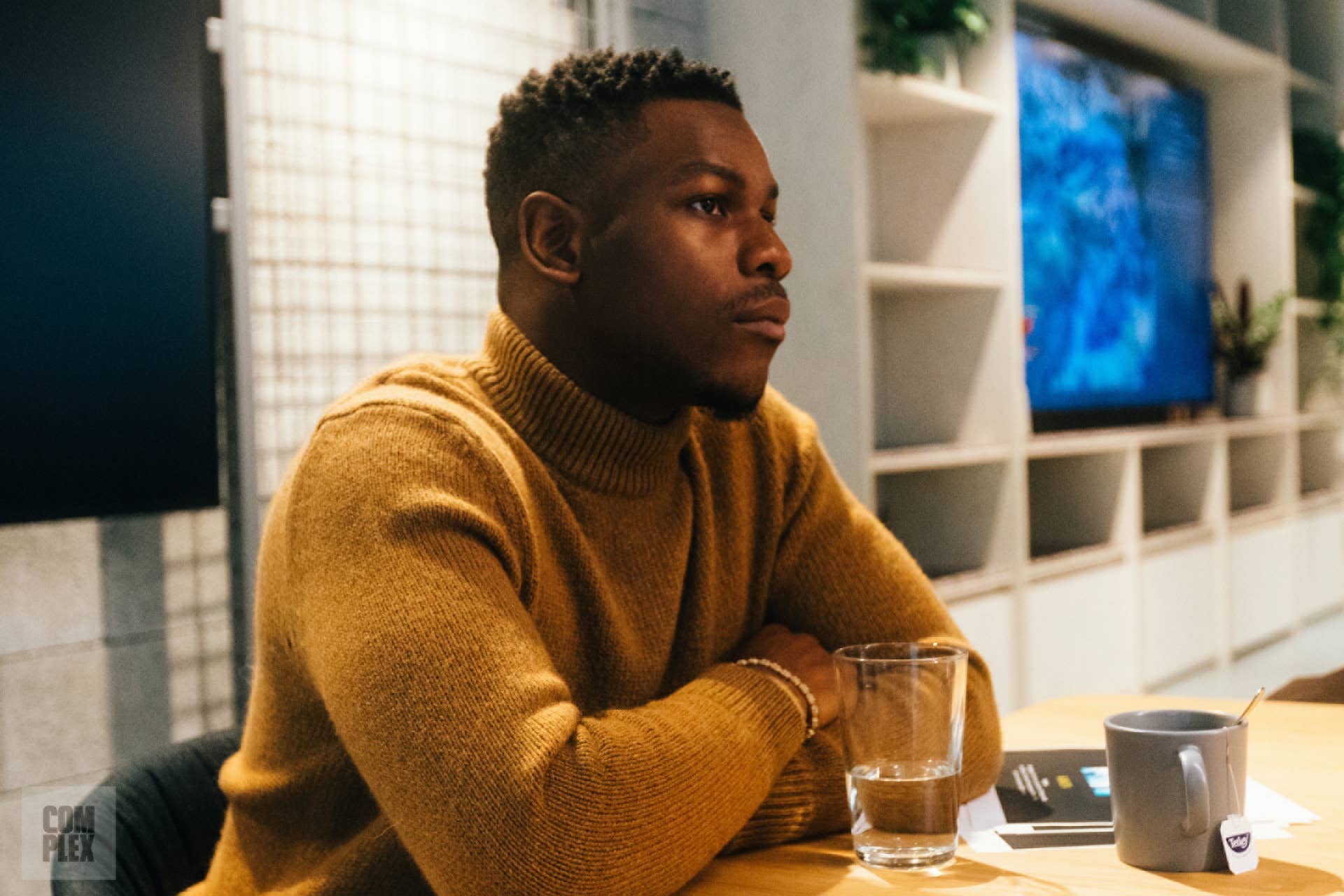
The Create Next Film Project is under Converse’s All Star Program, a robust, community-focused ecosystem of mentorship, commissions and funding that aims to create new and exciting opportunities for young creatives. At the heart of the Create Next Film Project is a focus on a new wave of Black talent, whilst highlighting issues within the film industry, as identified by John Boyega himself.
Sat around a long-table, a group of young, Black aspiring filmmakers from London convene. The conversation is one of mentoring, an open rumination on a project coming to its end, and a blend of gems from both sides of the filmmaking industry. Spearheaded by a vested John Boyega—the A-list Hollywood actor from Peckham—the Create Next Film Project is a process that is helping to find, nurture, fund and mentor Black filmmakers on the rise, and was set up in collaboration with Converse as part of its brilliant All Stars Program.
Converse’s All Stars Program serves a global network of creatives, providing experiences in a number of artistic forms and commissioning work, projects and opportunities like we see with the Create Next Film Project. Converse has worked with a world of creatives, from photographers and filmmakers to skateboarders, designers, artists and musicians. On this particular project, they tapped Mathieu Ajan of Bounce Cinema, a pop-up cinema that champions independent films, to help with the rollout. As much as this initiative has been about uplifting new and exciting film talent, it’s also been about acknowledging the very blatant representational issues within the industry, such as the lack of Black faces behind the silver screen.
Before the project began, Boyega was venturing through schools, setting up workshops and teaching children about the variation of roles in the film industry, in which he found many didn’t know some roles even existed. Part of the reason there’s a lack of representation within the industry is that people within such communities just don’t know the range of roles available to train into, or they don’t realise the transferable skills they already have and are invested in. There is also simply understanding the process, the caveats, of entering and maintaining work within the film industry. Having the space and opportunity to showcase such a goldmine of filmmaking talent within Black communities is a hard task. Reaching out and having an understanding with Converse, who through its All Stars Program have always advocated a multitude of ways to enable creativity to spawn, allowed this collaboration to find these aspiring filmmakers and inspire them through hands-on mentoring to produce short films in recognition of real industry experience.
We caught up with Boyega on the back-end of the last mentoring session with the filmmakers, who all spoke with an energy about their ideas and the process as if submerged in the industry with a professional spiel. It was fascinating to witness, to see young talent who have essentially come into their own and getting to realise their progress through John Boyega—an extremely talented actor, creative, and inspirational figure stemming from the Black British community.
“The thing that captivated me was how films made me feel as a ‘normal guy’, when I didn’t know what acting was. It’s a feeling I have never forgotten.”

COMPLEX: Why was Converse your partner of choice working on this project?
John Boyega: I think it was, for me, the track record. Obviously, you have to do research into who you’re working with, and they have—especially under the All Stars Program—created a platform and environment for creatives to connect, to improve, and have been doing that consistently. I wanted to collaborate with a brand that we all know of, that has been a part of our culture in one way or another, that we see in the commercial space as well as the normal, and that has that global appeal. But at the same time, a brand that is aware of the emptiness in our industry, the lack of opportunity, and is basically willing to put their money where their mouth is. Myself and Converse, once we spoke a number of times, we got to a point we were on the same page and knew we could do this.
Converse has definitely been within the community, like with their wider All Stars Program and collaborations with members of markers of the community, from up-and-coming artists to youth-led radio stations like Reprezent, to now working with yourself.
That’s what excited me as well—it’s been evident. We’re trying to create this ripple effect so we need people to see. It’s a balance of knowing these issues are important, and having the reach and also the funds to get it done.
That leads me onto my next question, which is more of a personal one: what captivated you about filmmaking as a form of storytelling and made you invest in it as a career?
I think the thing that captivated me was how films made me feel as a ‘normal guy’, when I didn’t know what acting was. It’s a feeling I have never forgotten, knowing that I won’t be able to feel that as natural anymore, being involved in the process. But, I now know 100% what it feels like to entertain someone in the audience when they have no knowledge of film or any of that stuff—they’re just coming in to see a story. Since I felt that, it changed my normal world. I didn’t see the world the same again. I watched feature films, and all of a sudden my life was more dramatic, colourful, and my narrative felt like it was heightened. I was like: “I obviously exist within this realm.” Obviously, not being good at certain things—trying football, trying several different things, and then finding where I actually fit in naturally—was a part of it too.
That is beautiful. I feel that as well, the fact that film can submerge you into a whole new lifestyle and perspective. When did you realise, as an actor and creative, that there was a lack of insight and opportunity for emerging Black talent?
I think I genuinely noticed when I started to work more consistently. I think, at the early stages, I’d do one job, then I’d have to do struggle-struggle, then I’d get another one and we’d do struggle-struggle for a while. I started to work more consistently to basically get a view of how it is in the working environments in the industry. Then, being exposed to these environments and meeting these professional individuals, filmmakers—especially up-and-coming filmmakers from the Black communities—I was educated. I was schooled. People came in and were like, “Yo, this is what the reality is for us: working in this industry.” This is the difference between opportunities somebody outside of the culture would get in reflection of us, and we’re trying as much as possible just to move forward. That really inspired me, and I listened to that. I realised there’s an issue there.


How important is it that spaces and initiatives to help spark creative talent become second nature in the community? And how do you feel your hands-on presence can contribute to helping inspire their careers?
It’s very important for us to have opportunities that create a bridge between our young and them having stability in the future. I remember growing up, one of the biggest issues was how long the process was to decide where you belong in this. Do you know how stressful that can be? From Year 9, still taking SATs, then they ask you: “Okay, now you gotta choose your subjects for GCSEs.” But I think these types of initiatives come with a more relaxed approach that also has funding behind it, giving people opportunities to be the best that they can be. That, in itself, will start to influence change and I hope other institutions and other filmmaking programmes do it too. It provides people with the bridge to access training, to better their skillset and also achieve something within an industry that is normally closed off.
I was really captivated catching your conversation with the mentees and getting to see how buzzing they were—I caught them at a moment in time! I understand how important mentality shifts are by the beginning and end of a project; you got to witness talent essentially evolve, but what were the big markers of their change?
At the beginning, there was that natural enthusiasm for what we were about to do. That feeling of, we can take and conquer the world, which I feel is a natural process in any kind of dreamer and creative’s vision. It’s a process and a journey, but that process and that dream is normally filtered out to just the good moments when it’s working well, because that’s what’s getting you excited. It’s the possibility of it working well, the possibility of it being the best film—which is what you need. But the flipside, which I think isn’t simply doubt or being realistic, is really having a vision that balances it all, that lets you know that—honestly—there’s going to be some obstacles, some situations. Knowing what was put in place for them, the kind of concept they were trying to bring to life, I knew that each one of them were going to have issues.
Even to shoot a little one-minute commercial segment, that can be very, very tricky. But I wanted to know how these issues affected them. That was the most important thing, but those issues are kind of a given. Sometimes it’s worth just seeing how individuals react to those issues, how they deal with those obstacles, and knowing what filmmaking is about in its truth. In the early stages, it was about the process, the technical sides, what shots to use, who’s going to be my DOP, who’s going to be my casting director. But we come to the flip of it, and it’s about managing people, discussing things, lateness, the tube strikes, information, communication. It was like giving them a real view of what it’s like, then seeing how they react to it.
This is an initiative trying to harness the best sides of these filmmakers, so seeing how they dealt with that, I was impressed by how they were able to look at themselves in the mirror. It wasn’t really a mentorship from the beginning—it was more like identifying for them: this is where I need to improve, and I was strong in this. I also taught them that it is very important for them to identify their strengths as well as their weaknesses. I don’t think they’re mutually exclusive. I need to see both. I need you to be able to identify both. The fact that they have that skillset, for them to feel stable at this stage and acknowledge where they need to improve, it means the awareness we were trying to instill through the process, they’ve naturally got it. I might have found myself some really good filmmakers. That’s all I’m saying.
“I don’t think I’ll be scared of going to the studios in a few years’ time with these guys beside me.”
It looked so natural, as if you guys have been plotting for a decade, and I believe I will see their names in lights at a Premiere one day. One more question I want to ask: you were dropping so many gems, and the way you were speaking about film and the caveats of the filmmaking process, as a man knees-deep in this industry, it made me wonder if throughout the program there were any gems you got from the filmmakers who are in a position you haven’t been in for quite a while?
Ade and Kaylen were talking about the ability to fight. Lorraine was speaking about that, too. Them having to fight for their own creative vision really inspired me because, in that mentality, sometimes one can feel quite isolated and alone. But they were talking like it’s normal. Like, “My film was about to be taken into production without it being the best it could be. I needed one more day.” These are things that I heard about when I got a little older in the industry. Everyone should have the right to back their own creative vision and hearing them say that, to be fair, reminded me and strengthened me. The fact that they were doing this at this stage, I don’t think I’ll be scared of going to the studios in a few years’ time with these guys beside me.

